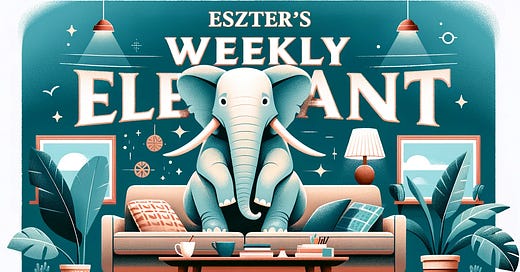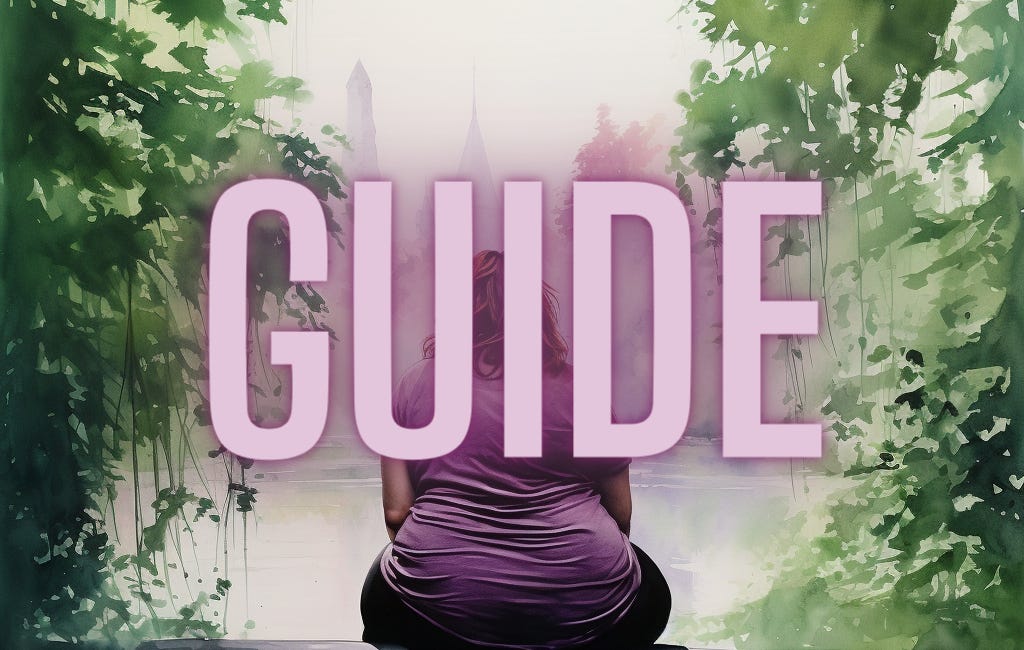Welcome, everyone, to the fourth issue of Eszter's Weekly Elephant! We hope everyone has had a great week!
Like in previous issues, this week we'll summarize the topics covered across all three of our publications. Many of you have surely noticed that, except for a few, all articles, short stories, guides, book reviews, and personal essays now require you to become paid subscribers.
After considerable reflection, we've decided to direct our message to individuals seeking effective self-development strategies. Our focus is on helping you understand the intricacies of the subconscious mind, including how traumas, emotions, and entrenched beliefs impact your life and relationships. We aim to guide you through processing these traumas, managing your emotions, and transforming detrimental beliefs for a healthier, more fulfilled life.
Our goal is to connect with individuals who are ready and willing to embrace a unique perspective, one that is fresh in many aspects and geared towards embracing change.
Through working with over a thousand clients and two decades of experimentation on ourselves, research, and learning, my husband and I have distilled the most efficient approaches, and the most potent methods.
We’ve also learned they're not for everyone; not due to a lack of benefit, but because some individuals are not yet ready for real change. And that's perfectly okay. Everything has its own time.
But for those who are ready to reevaluate their beliefs, to search for and confront their deep-rooted fears and emotions, who are willing to question and not just blindly accept the dogmas absorbed since childhood, our three publications offer very effective insights and methods.
In short, for those eager to transform their lives for the better, we invite you to join us and recognize the immense value derived from countless hours of reading, learning, and experimenting. This includes the energy, time, and financial investment spent exploring hundreds of thousands of pages, mastering various techniques, experimenting with numerous approaches, navigating through dead ends, fine-tuning methods, and delving deep into our own feelings and souls, emerging on the other side.
All of this effort is encapsulated in our articles, short stories, guides, and book recommendations, designed to save you time and guide your journey. We believe these publications, packed with insights and practical methods are worth the price of a large, frothy coffee a month.
The weekly edition of Eszter's Weekly Elephant will remain free. Following, you will find the topics we covered this week, about which we will write in more detail. Those who want to understand a topic more deeply should read the related article, short story, guide, or book review.
So, join us if you want to accelerate in the inner lane towards a happier, more fulfilled life, feeling about changes just like the guy with the squished nose in the picture below.
Happy reading!
#NotFastSoFurious
Eszter’s Weekly Elephant
Well, let's get started!
This week in Eszter's Weekly Elephant, I wrote about two very important topics that affect many people. One topic, which delves into relationship issues, may be familiar to many.
There are many relationship problems that we think can be solved if only our partner finally understands that something is not good for us or if they change their perspective. In other words, it's enough if they change. And of course, if they love us enough, then surely they can change an annoying habit, right?
However, when we see that the change is only temporary or doesn't happen at all, we become more bitter and angry. We don't understand why we are not important enough since all that needs to change is a habit that seems trivial to us. When we weigh the change against the love our partner should feel for us, the scale should clearly tip towards love, meaning our partner should choose to change their behavior. If this doesn't happen, many conclude that they are not important to the other, are not loved, if the relationship fails over such a "trivial" matter. Then come the breakups and divorces, instead of truly looking at what the other person is actually struggling with and what's on the other side of the scale. It's often not just one habit. It's much, much more. This is what I wrote about in the article "Family Systems on the Relationship Battlefield."
The other topic of the week is a phenomenon we call "the fat kid syndrome." Many think this is the same as the black sheep of the family, but it's a bit different here. The black sheep is the one who does not accept the belief system of the family, approaches it critically, and tries to live their life differently. This is the person who sees the games played within the family and often calls them out. Often, this ends in complete estrangement from the family, as every community wants to maintain its own norms, its own rules, whether good or bad, and those who refuse to bow down to these and conform, at the very least, have their lives made difficult, if not completely pushed out of the circle. The life of the black sheep is never easy, but this role has its undeniable advantages. I will write about this in a later article.
However, the "fat kid syndrome" covers something slightly different from the black sheep of the family, as the "fat kid" becomes "fat" precisely because they accept the family belief system, trying to find their place within it. This place is not exactly pleasant, but for some reason, the "fat kid" accepts this position. Why it's worth it for them and how one can exit this role if we recognize that we are our family's "fat kid," read about it in the article!
Eszter’s Reading Nook
I've often experienced how much a story can change one's perspective, how stories are suitable for making us look at the world more sensitively, more tolerantly, and how a really good story has so many layers. I've received a sea of feedback from the readers of my novels and short stories, supporting the idea that as many people as there are, that's how many ways there are to interpret a story and draw lessons from it. I won't deny that I enjoy it the most when readers see symbols, connections, details in my stories that I hadn't thought of. This always provides proof of how magical stories coming from the heart are.
Looking back on my life and my readings, every book, every story, even those I didn't really like, gave me something. A sentence, a perspective, which, even if I couldn't identify with, at least entered my consciousness as viewpoints from which others might see things. If we experience often enough how differently someone else can see the world, we become more tolerant towards each other. And that's worth a treasure.
Some stories that stirred emotions or addressed problems I also encountered helped me navigate and eventually calm my inner turmoil. Others served as cautionary tales, illustrating what not to do in certain situations, or even provided a blueprint for solving problems. One way or another, these stories enriched my life, and for that, I am grateful.
The intriguing, often surprising short stories published in Eszter's Reading Nook serve exactly this purpose. They address the problems I write about in the articles of Eszter's Weekly Elephant, helping us process traumas, complex feelings, or better understand the background of some life situations or relationship issues in an enjoyable, often magical manner.
This week's short story is about the self-sabotaging judgments we all struggle with, which prevent us from living a fulfilled, happy life. These could be beliefs about our appearance, our abilities, or our character. What they have in common is that they often accompany us for years, even decades, and we don't even notice the beauties we pass by in our lives, focusing constantly on these judgments spinning in our heads.
In the Guide linked to the short story, I elaborated on the cause of this phenomenon, the solutions available, and what might be the subconscious reasons behind our inability to change things, even if we want to. By honestly answering the questions in the guide, we can see more clearly the reasons for our stagnation. The short but very effective exercise at the end, if devoted a little time and energy to it occasionally, helps us accept ourselves better.
And those who like to think deeply and examine literary works from new perspectives can find the latest book review on Eszter's Reading Nook, examining Henry James's novella "Daisy Miller" from a family system perspective. Surely, many are familiar with this story, but I believe few would have considered it from this viewpoint.
Eszter’s Magic
As every week, this week too, you can read a personal piece in our publication, Eszter's Magic. This time, I describe an experience that fundamentally changed me and provided a guideline for quickly escaping the trap of spiritual ego, should I ever fall into it.
We often don't realize when we climb onto a pedestal, whether in our relationships, at our workplace, or in any other human connection or situation, until we feel very, very alone. But fortunately, there are people who don't drag us down with force or lectures but simply by their own example. They coax us off our marble pedestal by radiating such warmth that we prefer to be by their side rather than shivering meters above them on the pedestal. The question is, why is it so hard to admit that we belong somewhere?
See you all next week!
We look forward to your feedback on which writings helped you, what other topics you would be interested in exploring more deeply, and which stories touched you or made you think this week! We are all on our own journey, all searching for our path, all experts in different areas, and we all desire a happy, healthy, balanced life. We offer you our expertise gathered in the field of self-development through the writings in our publications.
We hope that those who are truly ready for change will join us!
Happy reading!
Disclaimer: The content in our publications should not be considered professional psychological or psychiatric advice. Therefore, everyone reads the articles and applies their content at their own risk.
Home | Notes | Articles | Eszter’s Magic | Literary Bonbons | Short Stories and Guides | Beyond the Book | EWE Issues | Archive | About











